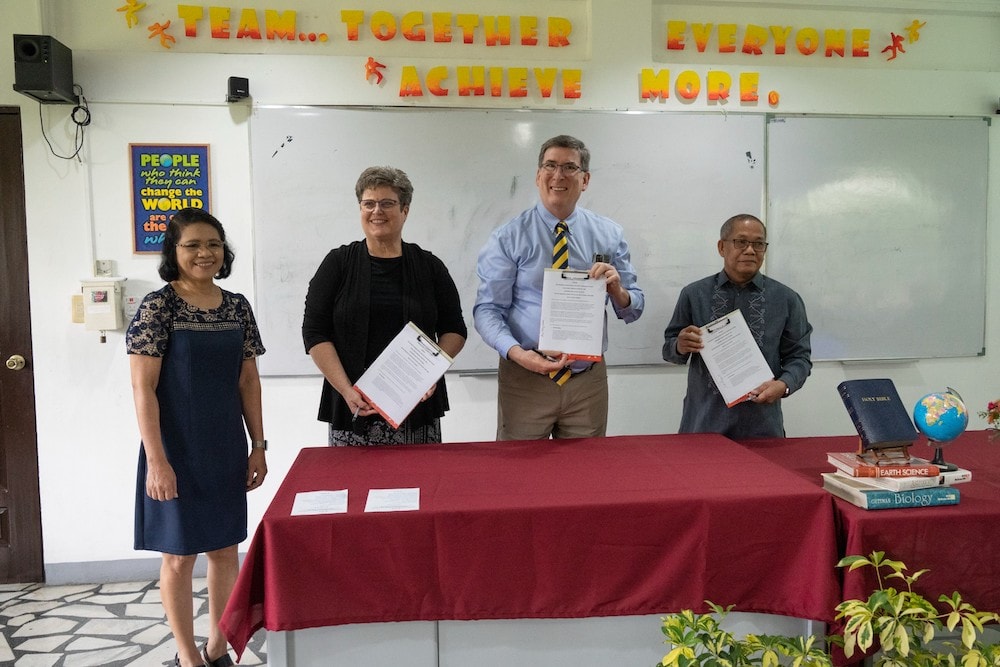
The Adventist International Institute of Advanced Studies (AIIAS) recently marked a significant milestone with the formal signing of a memorandum of understanding (MOU) with the Geoscience Research Institute (GRI) of the General Conference of Seventh-day Adventists and the Southern Asia-Pacific Division (SSD).
With the MOU in place, AIIAS has recently introduced a graduate faith and science certificate program, institutional leaders reported. “This program is specifically designed for educators and pastors in the SSD and is consistent with the Seventh-day Adventist belief in the understanding of God's Word and the exploration of the natural world through the lens of science,” they said.
AIIAS president Ginger Ketting-Weller emphasized the uniqueness and groundbreaking nature of this certificate program. “AIIAS is honored to host this cross-disciplinary program for graduate students who have not previously had the opportunity to engage with the intersection of science and faith in an academically rigorous and faith-committed approach,” she said. “We believe this initiative will fortify educational institutions and churches in our region.”
Students in the Graduate Certificate in Faith and Science program will gain a deeper understanding of the dynamic relationship between faith and science, leaders explained. “This program emphasizes the idea that science is rooted in a philosophical foundation. It emphasizes that scientific methods and ideas are linked to a precise way of viewing and comprehending the universe. This foundation rests upon the belief that God has equipped humans with senses to accurately perceive the world He created and with minds capable of comprehending His creation,” they said.
This program is consistent with Bienvenido G. Mergal’s approach as SSD education director. Mergal, a passionate advocate for the harmony of faith and science, expressed his enthusiasm for the program. “It represents a transformative journey that combines intellect and spirituality, enabling students to appreciate both realms and establish a fundamental connection between faith and science,” he said.
GRI’s Timothy Standish and AIIAS seminary professor Gheorghe Razmerita are now working with a cohort of 29 students enrolled in the program. The first courses dive into the delicate connection between faith and biology, as well as the philosophy of science, themes that have historically generated both study and occasional discord, leaders said.
Reflecting on the students of this new program, Standish said that it has been an honor to work with the first cohort of students taking the Graduate Certificate in Faith and Science. “Each student has contributed an interesting and informative viewpoint, and their passion is contagious,” Standish said. “I’m looking forward to seeing what they do with what we’ve worked on together, as well as the impact of their witness to their students and congregations.”
Participants are encouraged to approach these topics with intellectual integrity and an openness to diverse perspectives, program leaders emphasized. “The curriculum fosters a balanced approach and an environment where religious contemplation and scientific inquiry coexist, enhancing the participants’ ability to address the complex issues that arise at the intersection of faith and science,” they said.
Leni Casimiro, chair of the Education Department in the AIIAS Graduate School, affirmed the commitment to program excellence. “We will provide highly qualified professors and research supervisors, each possessing the necessary academic credentials, expertise, and experience,” he said.
Program leaders said the benefits of the curriculum are expected to extend beyond the classroom, as individuals and groups learn more about the link between faith and science.
The original version of this story was posted on the Southern Asia-Pacific Division news site.